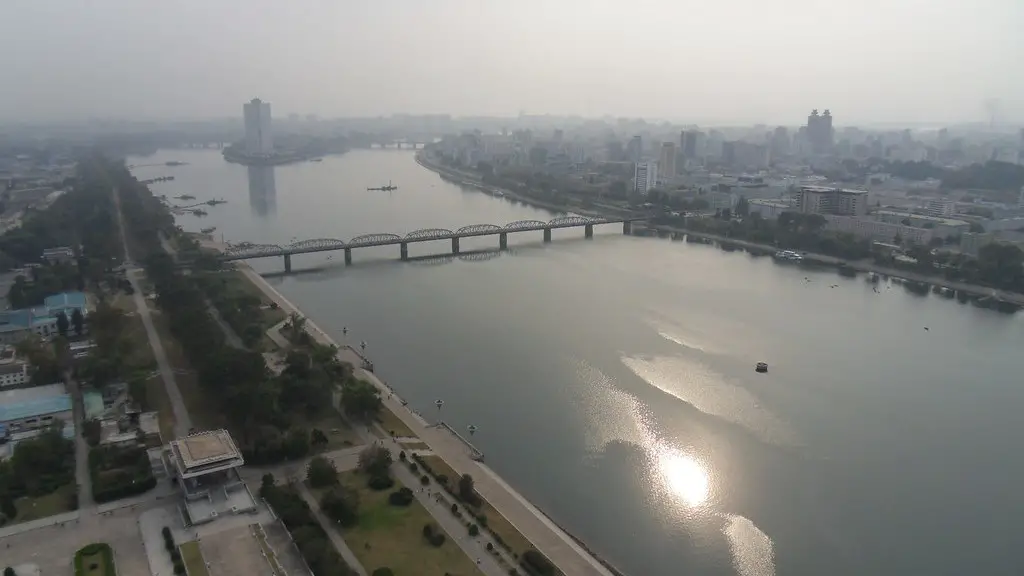Chernobyl and North Korea are two places that many travellers choose to avoid for a variety of reasons. While Chernobyl is known for the 1986 nuclear disaster, North Korea has been an isolated, totalitarian state for decades. While the Chernobyl Exclusion Zone, the 30-km (19-mile) area around the nuclear power plant, has been significantly reduced and opened to some tourists, due to a large extent to the Chernobyl clean-up efforts, it’s still a place not to be taken lightly. North Korea, as a closed-off nation, still has a lot of potential dangers and is nowhere near safe to travel.
Chernobyl is still an area full of radiation, but despite that, the tourism industry is expanding. There are tours that provide travellers with a safe and more controlled way to visit the area, and even stay in the Exclusion Zone for a few days. According to the Guidebook for Chernobyl, the region is more than safe for short-term visits and is completely safe from radiation. The potential issues that may arise are out of the ordinary, such as falling into a radioactive pool or exploring a contaminated building, but the risk of that happening is pretty low.
When it comes to North Korea, while entry into the nation is restricted, there are tour operators and travel groups who provide visitors with access. These trips are usually guided and usually demand full governmental and military accompaniment. All travellers are closely monitored and followed, and no communication or photography with the local people is allowed. According to experts, they advise people not to go at all due to political and human rights concerns, no matter how safe the trip may seem. It’s worth noting that some Westerners are jailed for minor offences and held for months, even for years, with no prospect of a trial or repatriation.
When travelling it’s best to do research in order to make an informed decision. For example, in the case of Chernobyl, research needs to be done in order to check the safety of the places tourists will visit and that any health protocols are in place. In the case of North Korea, research needs to be done to inform potential travellers about the restrictions, the current political climate and the potential risk that can come with being in the country. In both cases, it’s important to be aware that the risks associated with these places are no joke and the consequences can be much higher than what expected.
In conclusion, while both Chernobyl and North Korea can offer great experiences, they are still not places to be taken lightly. While there is a certain willingness to open up their borders, it’s important to remember that each comes with its own risks and potential consequences. Travellers should do their due diligence in order to be informed before making a decision.
The Economic Consequences of Chernobyl And North Korea
The Chernobyl disaster of 1986 has had major economic fallout for both the surrounding region and the former Soviet Union. Many areas in Belarus and the Ukraine have seen a drop in the value of their land and livestock due to the radiation from the disaster, and since then an entire industry has sprung up devoted to Chernobyl clean-up and containment. Tourists have flocked to the area, however, as the region has become known for its wildlife, much of which has returned since the meltdown.
North Korea, on the other hand, has seen less of an economic impact from its isolation. In recent years, the country’s economic growth has been stagnant due to the heavy sanctions imposed by the international community, its unreliable energy supply, and its lack of access to foreign capital and technology. These factors, combined with its lack of connection to the outside world, has kept the country largely secluded in both the economic and technological realm.
Additionally, due to the country’s extreme individual deprivation, North Korea has become an increasingly difficult place to do business. Developmentally, it’s still stuck in the late 20th century while its neighbors have rapidly modernized. There is a lack of skilled labor, a lack of investment, and a lack of infrastructure – all of which further propels the nation’s lack of economic prospects, and forces its citizens to look elsewhere for work and income.
Finally, due to the North Korean government’s attitude towards foreign investment and tourism, it’s extremely difficult for any business to operate in the country. Very few foreign companies have been able to establish any presence in North Korea, as the government has shown that it is not willing to budge on its position. Consequently, the majority of North Korea’s income comes from its citizens’ remittances, which are largely sent to the government or are subject to significant taxation.
The Tourism Industry Of Chernobyl And North Korea
The Chernobyl Exclusion Zone is now a huge tourist attraction and thousands of visitors choose to explore the area every year. Most notable is the fact that the area is undergoing a major clean-up and stabilization operation, which has opened up many new areas to visitors. Tourist attractions include the Chernobyl Nuclear Power Plant, where visitors can take a close look at the reactor chamber, and the Duga, a huge military radar system once used to find incoming ballistic missiles.
In North Korea, tourism is heavily restricted and tightly controlled by the government, and is largely limited to not only the capital city of Pyongyang, but also a few other sites. Tourists are usually kept in predetermined areas and usually accompanied by guides at all times. This is due to the risk of international backlash or unwanted news, as the government aims to control the image the world has of the country. Foreigners can, however, visit the most famous of sites such as the Korean Demilitarized Zone (DMZ) or sites of the Korean War.
There is, however, one notable exception – visiting North Korea for a concert or event – as the government is keen to promote the somewhat progressive image it is trying to project to the world. In 2016, for example, North Korea hosted the The Moranbong Band, a popular female pop group from the country. These events are the highlight of the North Korean tourism industry, as they bring an unprecedented level of exposure to the nation and are seen as a great way for tourists to experience the culture.
The Humanitarian Situation Of Chernobyl And North Korea
The effects of the Chernobyl disaster are still visible in Belarus and Ukraine, where many communities still live with the fallout of the nuclear disaster. This has caused a wide array of health problems, due to contamination of the air, drinking water, food, and soil. The high levels of residual radiation still prevent certain areas from being cultivated, or even inhabited. Additionally, some wildlife populations have not been able to return in full, and many areas still contain radioactive waste.
In North Korea, the situation is a bit more complex, as the nation is facing a severe humanitarian crisis. In 2021, about 40 percent of the population is living in extreme poverty, and the majority of the nation lacks access to clean drinking water. Sanitation and healthcare have also been heavily affected by international sanctions and the government’s inability to provide adequate resources to its people.
Additionally, the country has also experienced a severe famine. Due to a lack of resources and investment, food production has plummeted in the nation, leading to a significant rise in cases of starvation and malnutrition. Diplomatic efforts to address the food crisis are slowly beginning, but most foreign aid is often blocked or heavily restricted by the North Korean government, making it difficult for any improvement.
The Cultural Impact Of Chernobyl And North Korea
Chernobyl has had a lasting impact on the culture of Belarus and Ukraine. Many of the impacted countries have developed a fear about radiation and nuclear power, which has changed the way local populations relate to their environment and their understanding of nuclear energy. This fear has been reinforced by the fact that many of the communities impacted by the disaster have never been able to return to their homes.
North Korea remains one of the most isolated countries in the world and its culture remains largely unknown due to its heavy propaganda, rigid control, and extreme level of censorship. The government emphasizes the importance of its values of national loyalty and military strength, and websites and media referring to the outside world are heavily regulated. Further, the country relies heavily on heavily state-controlled propaganda and events in order to shape its national identity, while discouraging any departure from the official line.
The people of both countries also often carry a deep mistrust of the outside world, particularly in North Korea. The nation’s heavy propaganda focuses on international tensions and paint a picture of an outside world that is hostile, threatening, and out to get North Koreans. This mentality, paired with the country’s extreme isolation, has caused many North Koreans to view foreigners and the outside world with trepidation and wariness.
The Presence Of Radioactivity And Pollution In Chernobyl And North Korea
The presence of high levels of radioactivity in the area around Chernobyl, due to the disaster, is still present today. Many areas in Belarus and the Ukraine are still considered too dangerous for human habitation, and remain off-limits even over 30 years after the explosion. These areas are still being maintained and monitored, and the containment and clean-up operation of the area is still in progress.
Despite the many efforts made to limit the area’s radioactive contamination, it is still very much present in certain areas. For example, West of the Exclusion Zone, hundreds of wells in some villages still contain dangerously high levels of radiation. Therefore, it’s important for tourists to be aware that even though Chernobyl is open for visitation and tourism, it doesn’t mean that the danger of radiation is completely eliminated.
North Korea is also heavily polluted due to its lack of access to modern infrastructure and technology. The nation is severely lacking clean water, air and soil, leading many to suffer from health problems. In addition, the country produces large amounts of hazardous waste and toxic fumes, which are often left unchecked and without proper containment. This lack of regulation and oversight has caused a significant increase in pollution in the nation, leading to both air and water contamination.
Both, the Chernobyl Exclusion Zone and North Korea, come with a variety of risks and potential consequences, and it’s important for any visitor to be aware of them before deciding to visit either place. It’s also important to understand that both still maintain high levels of pollution and radiation, making it essential for everyone to take safety precautions and remain vigilant during their visit.





